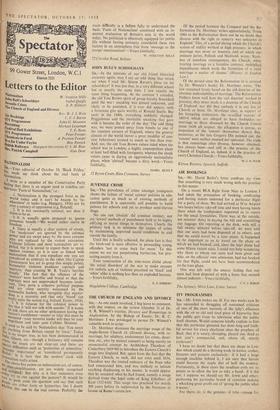Letters to the Editor
John Bull's Schooldays Juvenile Crime The Church of England and Nationalism Divorce W. Stratton Mills Isabel Quigly E. P. Hibbert Rev. W. J. S. Weir C. F. J. Baron John G. Moreton Michael Leaman T. E. Bean Peter Forster A. Preston-Tewart Ben Perrick Stevenson, 0. S. M. Raw Alan Dent Air Bookings
ITV Progra llllll es Recruiting
Festival Hall Exhibitions ITV Programmes
Chemicals in Food
In a Jar Under Foyles British Railways Margaret Mrs, Patrick Campbell
NATIONALISM SIR,--Your editorial of October 10, 'Black Friday,' l'aa made me think about the real basis of nationalism. I write as a member of the Conservative Party feeling that there is an urgent need to redefine cer- tain basic 'Facts of Nationalism,' i.e.: 1. Nationalism is the strongest force in the world today and it can't be beaten by 're- education' or tanks (e.g. Hungary, 1956) nor by over a century of oppression (e.g. Poland).
2, It is not necessarily rational, nor does it claim to be so.
3. It is usually quite prepared to ignore economic benefit—We would rather starve in freedom. . • 4. There is usually a clear pattern of events. The 'moderates' are ignored by the colonial Power and are swept away by the more extreme Who are replaced by the violent extremists. Violence follows and most nationalists are re- Pelled, but it is unreal to expect them to speak against violence, as it is now so linked with nationalism that if you repudiate one you are considered as contrary to the other (the Cyprus Government has yet to grasp this simple point). Nationalist violence produces reprisals and 'martyrs,' thus creating W. B. Yeats's `terrible beauty.' The fact that the offences of the martyrs' were horrible and brutal or that the reprisals were not unprovoked becomes irrele- vant. They serve a cohesive political purpose and are often secretly welcomed by the nationalist leaders, who recognise that martyr- dom is a necessity and that only 'blood' can really unite the nation (e.g. Ireland, Easter, 1916).. S. It is fatuous for the colonial power to say that it 'will not talk with murder.' If it wants to talk there are no other spokesmen having the nation's confidence—sooner or later this must be itecePted—yohr terrorist leader will then be your negotiator and later your Cabinet Minister. getlt used to be said by Nationalists that 'You never his a:nYthing from Britain except by force.' Today wnd]asagtr i no loer ue, as has been demonstrated in
Ghan etc.—though a hesitancy still remains
3,`,,ere the issues are not clear-cut and there are
.s7renil difficulties such as 'protection of minorities,'
114.1eLgie importance' or `considered permanently
nationalism It is here that the modern clash with
The really arises. an 'Lc above five points on nationalism are, of course, and over-simplification, yet are widely recognised fod, nccepted But why is it that statesmen even eas„41/ try to run against the pattern? It would be peoj to push aside the question and say that such iyhsPle are either fools or hypocrites, but I doubt Lther this can be the real answer. Probably the main difficulty is a failure fully to understand the basic `Facts of Nationalism' combined with an in- correct evaluation of Britain's role in the world today. No politician is effectively equipped for public life without having seriously considered these two factors in an atmosphere free from 'message to the troops' emotionalism I —Yours faithfully,


































 Previous page
Previous page